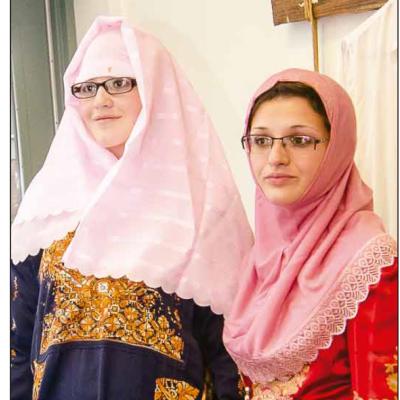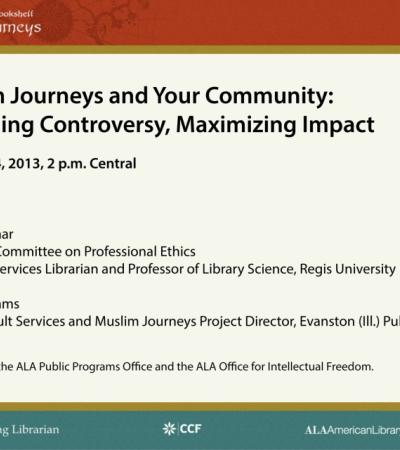Editor's Note: Calling all readers attending ALA's 2014 Annual Conference. For more insights on planning and managing controversial programs at your library, check out the session "Managing Challenges, Maximizing Impact: Policies and Practices for Controversial Programming," offered by ALA's Public Programs Office. In the session, intellectual freedom advocates and experienced programming librarians will discuss how to prepare for and host events that may attract controversy, but also can increase visibility and foster community engagement.

“Fools rush in where angels fear to tread.”
Perhaps that proverb best illustrates my experience in applying for the Bridging Cultures: Muslim Journeys Bookshelf and Let’s Talk About It grant co-sponsored by the American Library Association and the National Endowment for the Humanities.
When I first read about the Muslim Journeys program, my reaction was an immediate, “Wow! That sounds like a great opportunity!”
“Bridging Cultures is an NEH initiative that engages the power of the humanities to promote understanding and mutual respect for people with diverse histories cultures, and perspectives within the United States and abroad.”
As director of a very small rural library in the Midwest, I don’t like to pass up opportunities for high-quality, inexpensive programs. I weigh the odds — how likely we are to win a grant (or a collection of books and other resources) versus how much time it will take to apply and execute the requirements of the grant.
And of course, I consider the content. After all, libraries are places where issues can be freely discussed. Where they ought to be discussed, where civil discourse needs to take place so we can learn from each other, hear each others' point of view.
The Bookshelf program, a collaboration between the ALA and the NEH, seemed like a no-brainer.
We had received the Picturing America Bookshelf and had a wonderful, positive experience promoting the books and planning a program in conjunction with them. It was a great opportunity to showcase both the collection of books and the 40 works of art that made up the Picturing America poster collection, which we had also received.
I figured Muslim Journeys would be much the same.
Twenty-five free books, four DVDs, free access to an online database. Who could resist? All that in exchange for scheduling one program, which could be as simple as showing one of the DVDs. That was the basic requirement to receive the collection. One thousand libraries would be selected.
Once selected for the Bookshelf, libraries could apply for one of 125 Let’s Talk About It: Muslim Journeys reading and discussion grants, which would provide funding for books, engaging the services of a scholar to lead the discussions, and related programming expenses.
Our town is tiny; our collective experience with Muslims limited. The only interaction with a Muslim I can recall having in the more than 30 years I’ve lived in Morenci was through the Living Library (now known as the Human Library) event we hosted five years ago.
The Muslim “book” was wildly popular during the program. Over a three-hour period in which patrons “checked out people” who exemplify stereotypes, we couldn’t keep Ali on the “shelf.” From teens to older adults, everyone wanted to learn more from Ali — a student we had found at a nearby college.
Our experience with our Muslim “book” told me there was a thirst for knowledge — the Muslim Journeys program seemed like it would fill a need to know. What an excellent way to learn more, to discuss another culture, to broaden our views, elevate our intellect.
Or not.
Repercussions
Where I naively thought “opportunity and possibility,” others thought ... differently.
Almost immediately after the announcement that our tiny rural library won one of the 125 Let’s Talk About It grants, a patron questioned who was behind the funding. She was concerned that a Muslim group might be bankrolling the endeavor to put Islam and Muslims in a positive light ... propaganda in the guise of an intellectually stimulating program.
We’d had such positive experiences with ALA and NEH regarding the Picturing America initiative, I was confident that the funding would be unbiased. But we take patrons’ concerns seriously; I emailed the NEH to find out. They responded swiftly:
“The Bridging Cultures: Muslim Journeys Bookshelf was developed and distributed with major support from Carnegie Corporation of New York. Additional support for the arts and media components was provided by the Doris Duke Foundation for Islamic Art. Funding for the Let’s Talk About It program grants is provided by the National Endowment for the Humanities as part of its Bridging Cultures initiative.”
Another patron asked, “Why are you doing this?” almost as if I had an ulterior, nefarious motive. I truly didn’t understand the question. He was a former teacher. Fool that I am, some things are just self-evident to me.
“The program aims to familiarize public audiences in the United States with the people, places, history, faith and cultures of Muslims in the United States and around the world.”
How can that be objectionable? Why wouldn’t I be “doing this?” Are libraries not about informing and helping people understand topics of every nature? Doesn’t literature help us learn best about others’ experiences?
“Come to the discussion; see what it’s all about,” we said after explaining the program to the former teacher. We thought he might attend one of the five discussions, but, much to my chagrin, he never did. I worried that he would write a negative letter to the editor, but he didn’t do that either.
A patron who planned to participate in the discussion series mentioned it to several acquaintances. One of them said to her, "I hope you have a strong foundation in your faith if you're going to do that."
And, out of nowhere, the couple we had contracted with for several years to clean our library abruptly submitted their resignation. Through the small town grapevine we learned they quit because the library was hosting Muslim Journeys and “never does Christian programming,” not, as they had said, because they were cutting back on their work hours.
"Spewing hate"
The scariest blowback came on the day of our Muslim Journeys kick-off — an event designed to give guests a greater understanding of the Arab and Islamic world. It included two presentations by educators from Dearborn’s Arab American National Museum, a dabke dance demonstration, a dinner with Middle Eastern foods, exhibits and a display of cultural artifacts, including clothing. An elderly Navy veteran showed up at the newspaper office in town, absolutely enraged.
After reading about the kick-off event in the county newspaper, he had traveled more than half an hour to Morenci. On his way, he had stopped at the Veterans of Foreign Wars hall, the American Legion post and several stores trying to incite people to attend and protest. Conveniently, my husband is the owner/editor/publisher/reporter/photographer/janitor of the newspaper and a big supporter of the Muslim Journeys program. He was able to address the man’s concerns.
“He was just spewing hate,” David said. “He asked me who was behind it, and I told him it was my wife.”
The exchange went on for some time. David told him, “I think it’s a great idea,” and the guest was baffled because he thought everyone would be angry at the library.
David suggested that the man should attend because he would be just the sort of person who could really benefit from the program by learning more about the Muslim culture.
David told him that the leader of the discussion group is a Vietnam veteran and his assistant fought in Iraq and Afghanistan. That’s what really diffused the man’s anger.
Go there
Around the midpoint of our monthly discussion series, I asked a fellow librarian why he hadn’t applied for the Bookshelf grant.
“I didn’t want to go there,” he said.
I didn’t think I was going anywhere in particular when I applied for the Bridging Cultures: Muslim Journeys Bookshelf. I just wanted our community to learn, to discuss issues, to try to understand others.
I didn’t know I would be corresponding with the National Endowment for the Humanities on the source of funding or hiring a new cleaning lady or subjecting my husband to the wrath of an angry veteran.
And, no, I didn’t want to go there, either.
But the source of those reactions, I believe, was one word: the M-word, “Muslim,” and every negative thing it stands for in the minds of those who objected to the program. If a library isn’t the place to learn what informs that viewpoint, to learn what it really means to be that word, to quell the spread of misinformation, to engage in discussions of social and cultural issues, then what is?
Libraries are that place.
So, how do we get people with opposing viewpoints through the library doors — peacefully, not enraged — so they can learn from programs like Muslim Journeys? I have found no easy answer. Perhaps if I had spoken to church groups and other community organizations, such as Kiwanis, I could have promoted the program to them and allayed some concerns.
As it was, almost everyone who attended our programs was open-minded and eager to discuss these issues. We all seemed of a like mind. I had hoped those who were opposed — those who questioned why we applied for the grant, the cleaning lady and her husband, the former teacher, the veteran — would participate.
This issue came up at our last Muslim Journeys session. One of the participants made a valid point: all those who did attend were now more educated and had a greater understanding, and they would pass that education on to others. They would be ambassadors. The discussion started in the library would continue in the community.
As one Morenci high school student said when we hosted the Living (Human) Library program, “It’s only through talking to each other one on one that we’ll learn to understand each other.”
Take it from this fool. Go there.



